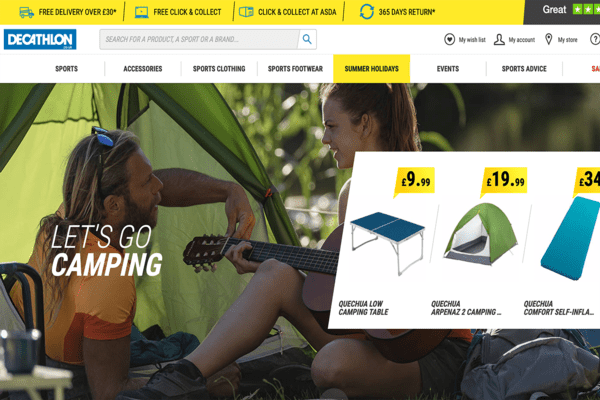A growing number of brands and merchants are starting to embrace the idea of enterprise marketplaces, with 36% putting their goods up for sale via these sites, according to a new benchmark.
Over the last year, marketplaces have grown at more than double the rate of eCommerce, demonstrating the increasing importance of third-party sellers in enabling top retailers to provide customers with anytime, anywhere access to the products they need.
Surfing this wave of interest in marketplaces, a growing number of retailers are expanding their product range and reach by setting up their own marketplaces and selling other brands and retailers goods. And it seems to be working.
According to the 2021 Enterprise Marketplace Seller Report from enterprise marketplace SaaS platform Mirakl, there has been a 36% leap in sellers joining enterprise marketplaces in past 15 months. The largest sellers (top 25%) contribute 88% of gross merchandise value (GMV); and sellers outperform traditional eCommerce customer service benchmarks, with 50% lower return rates and 4.5/5 satisfaction ratings.
The report finds that there are three primary types of sellers: marketplace native sellers (generating 63% of GMV across all enterprise marketplaces in Q1 2021); brand sellers (generating 20% of GMV); and eCommerce retailers (generating 17% of GMV). The variety allows retailers to more precisely tune and curate the composition of their marketplaces to better serve the needs of their shoppers.
While large sellers accounted for 88% of marketplace GMV during the first quarter of 2021, small-and medium-sized sellers have doubled their GMV contribution in that same period and tripled in the past year. Small-to mid-sized sellers will continue to be a force in the coming years as retailers look for unique product selections. The momentum of enterprise marketplaces is reflected in the increasing rush of sellers online: More than a third (36%) of sellers joined enterprise marketplaces in just the last 15 months.
Cross-marketplace coverage is also on the rise, as sellers are seeking – and finding – expansion opportunities by partnering with leading retailers. Nearly half (47%) of sellers are now covering multiple marketplaces, up from 38% the previous year. As they expand, however, they proactively differentiate their assortment to match the needs of each partner: 74% of these sellers have different catalogues per marketplace.
According to the study, time-to-value is accelerating for marketplace sellers. The fastest 25% of sellers averaged only five calendar days of total onboarding, from first contact to live marketplace offer, with catalog integration taking as little as a single day. A retention rate of 93% reflects a lasting relationship between seller and marketplace.
The report also highlights that sellers tend to expand to additional marketplaces after succeeding on their first marketplace, leading to an environment where sellers are treated like marketplace customers.
“The acceleration of the enterprise marketplace model is expanding opportunities for incumbent retailers and third-party sellers alike to come together and thrive in a highly competitive eCommerce environment,” says Adrien Nussenbaum, co-founder and co-CEO of Mirakl. “The data from this new report quantifies that in addition to gaining new GMV from each new third-party seller, sellers are key to retailer marketplaces expanding their assortment faster, with greater differentiation, and higher customer satisfaction than through traditional eCommerce models alone.”
The strategy has already borne fruit for several retailers including Decathlon and Express Inc. The shift towards selling via a marketplace is a part of Decathlon’s international strategy. Its first marketplace opened on its Belgian website, where marketplace sales now account for 8.5% of sales on the website.
Decathlon opened its new marketplace selling health and sports brands in the UK in June. Overall, Decathlon expects to see more than a billion euros in marketplace sales within five years.
US fashion company Express Inc, meanwhile, has seen its marketplace that sells other brands go from strength to strength. “We are very, very happy with the quarter-over-quarter and month-over-month growth we are seeing in the marketplace,” says Timothy Baxter, CEO of Express, Inc.
Rocky Collins, founder and CEO of CALI HNDSME, a seller of men’s skincare products on Express’s enterprise marketplace, adds: “Express’s marketplace accounted for 30% of my company’s sales during the holiday season, and most customers who come through the site are new to our brand,” stated









